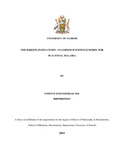| dc.contributor.author | Onditi, Faith I | |
| dc.date.accessioned | 2015-12-10T07:48:07Z | |
| dc.date.available | 2015-12-10T07:48:07Z | |
| dc.date.issued | 2015 | |
| dc.identifier.uri | http://hdl.handle.net/11295/93278 | |
| dc.description.abstract | Pregnant women and foetal well-being are compromised by malaria due to downregulation of
normal maternal immune response during pregnancy. Consequently cell mediated immunity
(Th1) is suppressed and as a result, the mother relies on humoral immunity (Th2) for protection
against pathogenic infections like malaria. However, during placental malaria the maternal
immune system is able to respond to the Plasmodium parasite infection.
This study sought to characterize the effect of placental malaria on pregnant baboons and infants
born to placental malaria positive mothers experimentally infected with Plasmodium knowlesi
blood stage parasites.
Chapters one, two and three of this thesis focus on general introduction, literature review and
methodology respectively. Chapter 4 describes the methods for obtaining clinical,
haematological and parasitaemia indices associated with placental malaria infection in nonimmune
baboons at different trimesters and the results obtained. Chapter five describes the
methods for characterizing pathological features associated with placental malaria in P. knowlesi
infected baboons and the results obtained. Chapter six describes the methods for determining the
importance of placental malaria in protecting baboon infants against the progression of the
disease via passive immunity while chapter seven describes the methods of quantifying T
lymphocyte population and cytokine profile associated with P. knowlesi infection in pregnant
baboons. Finally, chapter eight gives a general discussion and conclusions in the study while
chapter nine describes the challenges of the study and the way forward.
Date generated from this study presents haematological and clinical indices associated with P.
knowlesi malaria infection in pregnant Olive baboons. It also demonstrates pathophysiology of
placental malaria, infant protection during P. knowlesi infection and cytokine profiles associated
with placental malaria in Olive baboons. These features mimic placental malaria infection in P.
falciparum pregnant women. Therefore, we propose that the baboon-P. knowlesi model is an
ideal model for experimental therapeutics in management of malaria in pregnancy. | en_US |
| dc.language.iso | en | en_US |
| dc.publisher | University of Nairobi | en_US |
| dc.title | The baboon (papio anubis) –plasmodium knowlesi model for placental malaria | en_US |
| dc.type | Thesis | en_US |
| dc.description.department | a
Department of Psychiatry, University of Nairobi, ; bDepartment of Mental Health, School of Medicine,
Moi University, Eldoret, Kenya | |

